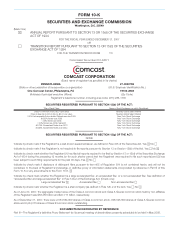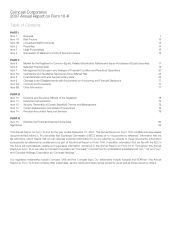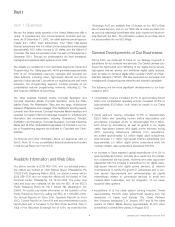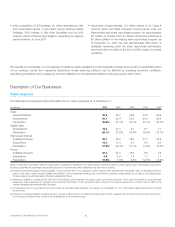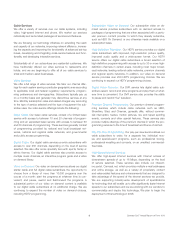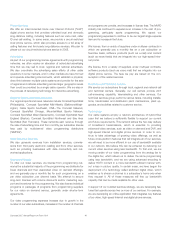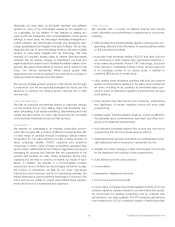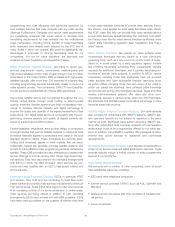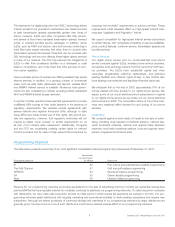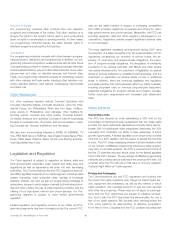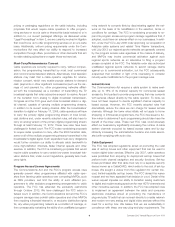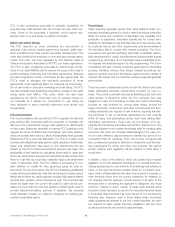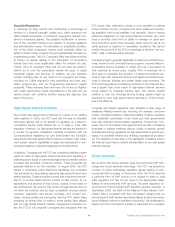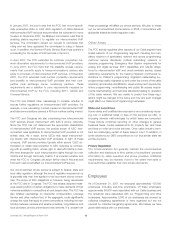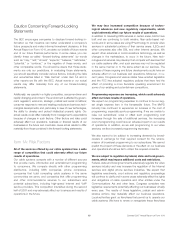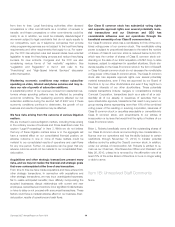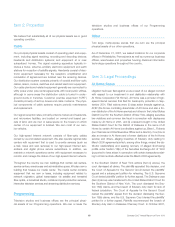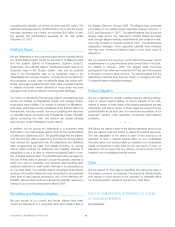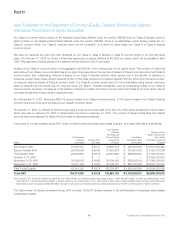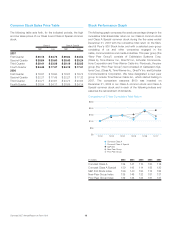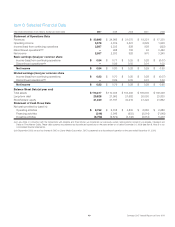Comcast 2007 Annual Report Download - page 11
Download and view the complete annual report
Please find page 11 of the 2007 Comcast annual report below. You can navigate through the pages in the report by either clicking on the pages listed below, or by using the keyword search tool below to find specific information within the annual report.pricing or packaging regulations on the cable industry, including
proposals that would require cable operators to offer program-
ming services on an a la carte or themed-tier basis instead of, or in
addition to, our current packaged offerings. As discussed under
“Legal Proceedings” in Item 3, we are currently involved in litigation
that could force us to offer programming services on an a la carte
basis. Additionally, uniform pricing requirements under the Com-
munications Act may affect our ability to respond to increased
competition through offers, promotions or other discounts that aim
to retain existing subscribers or regain those we have lost.
Must-Carry/Retransmission Consent
Cable operators are currently required to carry, without compen-
sation, the programming transmitted by most local commercial
and noncommercial television stations. Alternatively, local television
stations may insist that a cable operator negotiate for retrans-
mission consent, which may enable popular stations to demand
cash payments or other significant concessions (such as the car-
riage of, and payment for, other programming networks affiliat-
ed with the broadcaster) as a condition of transmitting the TV
broadcast signals that video subscribers expect to receive. As part
of the transition from analog to digital broadcast transmission,
Congress and the FCC gave each local broadcast station a digi-
tal channel, capable of carrying multiple programming streams,
in addition to its current analog channel. After the broadcasters’
transition to digital on February 17, 2009, cable operators will have
to carry the primary digital programming stream of local broad-
cast stations and, under recently adopted rules, will also have to
carry an analog version of the primary digital programming stream
through at least February 17, 2012. These new rules have been
challenged in federal court. The FCC is also considering proposals
to require cable operators to carry, after the 2009 transition date,
some or all of the multiple programming streams transmitted in the
broadcaster’s digital signal. Such expanded must-carry obligations
would further constrain our ability to allocate cable bandwidth to
more high-definition channels, faster Internet speeds and other
services. In addition, the FCC is considering proposals that would
require cable operators to carry certain low power broadcast tele-
vision stations that, under current regulations, generally lack must-
carry rights.
Program Access/License Agreements
The Communications Act and the FCC’s program access rules
generally prevent video programmers affiliated with cable oper-
ators from favoring cable operators over competing MVPDs, such
as DBS providers, and limit the ability of such affiliated pro-
grammers to offer exclusive programming arrangements to cable
operators. The FCC has extended the exclusivity restrictions
through October 2012. We have challenged this FCC action in
federal court. In addition, the Communications Act and the FCC’s
program carriage rules prohibit cable operators and other MVPDs
from requiring a financial interest in, or exclusive distribution rights
for, any video programming network as a condition of carriage, or
from unreasonably restraining the ability of an unaffiliated program-
ming network to compete fairly by discriminating against the net-
work on the basis of its nonaffiliation in the selection, terms or
conditions for carriage. The FCC is considering proposals to ex-
pand its program access and program carriage regulations that, if
adopted, could have an adverse effect on our businesses. In addi-
tion, under the FCC’s July 2006 order approving our acquisition of
Adelphia cable systems and related Time Warner transactions,
until July 2012 our regional sports networks are generally covered
by the program access rules regardless of the means of delivery,
and MVPDs may invoke commercial arbitration against such
regional sports networks as an alternative to filing a program
access complaint at the FCC. The Adelphia order also authorized
unaffiliated regional sports networks to submit carriage claims
against us to commercial arbitration, but the FCC subsequently
suspended that condition in light of its rulemaking to consider
industry-wide modifications to the program carriage rules.
Leased Access
The Communications Act requires a cable system to make avail-
able up to 15% of its channel capacity for commercial leased
access by third parties to provide programming that may compete
with services offered directly by the cable operator. To date, we
have not been required to devote significant channel capacity to
leased access. However, the FCC recently adopted rules that
dramatically reduce the rates we can charge for leased access
channels. Although the lower rates initially will not apply to home
shopping or infomercial programmers, the FCC has issued a fur-
ther notice to determine if such programming should also have the
benefit of the lower rates. These new FCC rules could adversely
affect our business by significantly increasing the number of cable
system channels occupied by leased access users and by sig-
nificantly increasing the administrative burdens and costs associ-
ated with complying with such rules.
Cable Equipment
The FCC has adopted regulations aimed at promoting the retail
sale of set-top boxes and other equipment that can be used to
receive digital video services. Effective July 2007, cable operators
were prohibited from acquiring for deployment set-top boxes that
perform both channel navigation and security functions. Set-top
boxes purchased after that date must rely on a separate security
device known as a CableCARD, which adds to the cost of set-top
boxes. We sought a waiver from this regulation for certain low-
cost, limited-capability set-top boxes. The FCC denied the waiver
request and we have appealed that decision in court. Denial of the
waiver request impedes our ability to transition analog customers
to digital and reclaim analog spectrum for new HDTV channels and
other innovative services. In addition, the FCC has adopted rules
to implement an agreement between the cable and consumer
electronics industries aimed at promoting the manufacture of
plug-and-play TV sets that can connect directly to a cable network
and receive one-way analog and digital video services without the
need for a set-top box. We believe that we are substantially in
compliance with these one-way plug-and-play requirements. The
9Comcast 2007 Annual Report on Form 10-K

